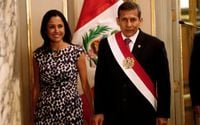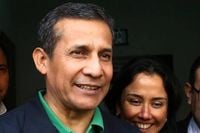Nadine Heredia, the wife of former Peruvian President Ollanta Humala, has sought asylum at the Brazilian Embassy in Lima just hours after both were sentenced to 15 years in prison for money laundering linked to a high-profile corruption scandal involving the Brazilian construction giant Odebrecht. The dramatic turn of events unfolded on Tuesday, April 15, 2025, when the Peruvian judiciary found the couple guilty of accepting illicit funds from Odebrecht for their political campaigns.
According to reports from the Peruvian Ministry of Foreign Affairs, Heredia entered the Brazilian embassy early in the morning on the same day the court delivered its verdict. The ministry confirmed that Heredia's asylum request is in accordance with the 1954 Convention on Diplomatic Asylum, to which both Peru and Brazil are signatories. The Brazilian Foreign Ministry also acknowledged her presence at the embassy but refrained from providing further details about the asylum request.
The court's ruling marks a significant moment in Peru's ongoing struggle with corruption, particularly in light of the Odebrecht scandal that has implicated numerous political figures across Latin America. Humala and Heredia were convicted for laundering money received from Odebrecht and funds from the Venezuelan government under Hugo Chávez, which were used to finance their respective campaigns in 2006 and 2011.
Prosecutors had initially sought harsher penalties, requesting 20 years for Humala and 26 years for Heredia. They argued that the couple had received around $3 million from Odebrecht and an additional $200,000 from Chávez for their election bids. The court found that Heredia had also concealed real estate purchases made with some of the illicit funds.
Following the sentencing, Judge Nayko Coronado ordered immediate arrest warrants for both Humala and Heredia. Humala was taken into custody at the hearing, while Heredia's absence from the proceedings led to a warrant being issued against her. Heredia's defense team claimed she was unable to attend due to health issues, a statement that has not quelled the controversy surrounding the case.
As the news of their sentencing broke, Heredia's request for asylum was swiftly granted by the Brazilian government. President Dina Boluarte of Peru subsequently issued a safe conduct pass, allowing Heredia and their youngest son, Samin Mallko Ollanta Humala Heredia, to leave the embassy and travel to Brazil. Reports indicate that they will arrive in Brazil on a Brazilian Air Force plane, which made a refueling stop in Cuiabá before heading to Brasília.
Upon arrival in Brazil, Heredia and her son will join a growing list of political figures seeking refuge from legal troubles stemming from the Odebrecht scandal. Since the revelations of widespread corruption involving the company, several former Peruvian presidents have faced legal repercussions. Notably, former Presidents Alan García and Pedro Pablo Kuczynski have also been embroiled in corruption allegations, with García tragically taking his own life in 2019 as police arrived to arrest him.
Odebrecht, now known as Novonor, has admitted to paying at least $29 million in bribes to Peruvian officials from 2005 to 2014, a scandal that has rocked the political landscape in Peru. The company has been at the center of the so-called "Lava Jato" (Car Wash) investigation, which has revealed extensive corruption throughout the region.
Humala, who served as president from 2011 to 2016, is the second former Peruvian president to be imprisoned in connection with the Odebrecht scandal. His political career has been marked by allegations of corruption and political persecution, a narrative he maintained throughout the trial. His legal team has indicated plans to appeal the court's decision, which they argue was influenced by political motivations rather than solid evidence.
As the situation unfolds, the Brazilian government has stated that it is in constant communication with Peru regarding Heredia's asylum status. The complexities of international asylum laws and the implications for diplomatic relations between the two countries are likely to be closely monitored as this high-profile case develops.
The events of April 15, 2025, have once again highlighted the pervasive issue of corruption in Peru, a country that has seen numerous leaders fall from grace due to their involvement in corrupt practices. The case of Humala and Heredia serves as a stark reminder of the challenges facing Latin American democracies in their fight against corruption and the quest for accountability.
As Heredia begins her new life in Brazil, the implications of her asylum request will resonate beyond her personal circumstances. It raises questions about the future of political accountability in Peru and the broader region, where corruption scandals have become all too common.









